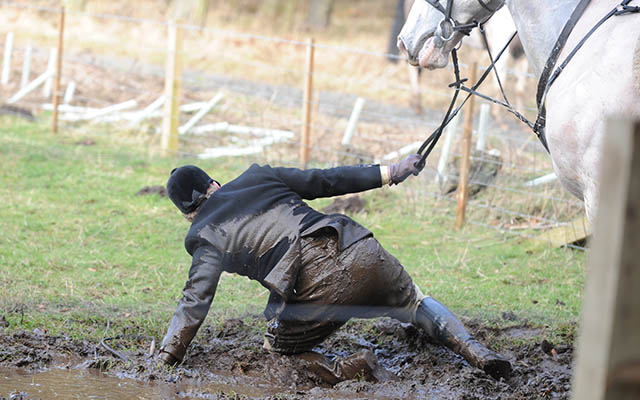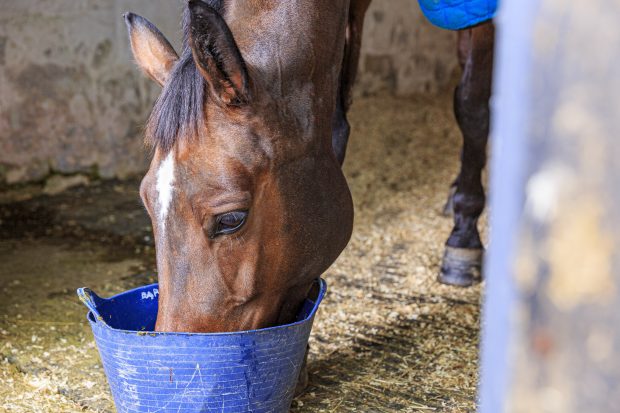Feeding your horse during the winter can be a challenge, so we asked the experts how to feed your horse for less during the colder months, without compromising their health and performance.
Forage
Most feed companies agree that if you feed good-quality forage, whether bagged or straight off the field, you will need to feed less hard feed, thus saving money.
“Grass, whether fresh or conserved, represents the best value for money when feeding horses and if they receive it ad-lib you may need to spend less on hard food,” says Nicola Tyler, nutrition director at TopSpec Equine. “For horses in light to medium work, the addition of a feed balancer to forage is often all they will need.”
Chris Tar of Mark Westaway & Son, which manufactures HorseHage and Mollichaff, agrees: “When a high-quality bagged forage is used as the main forage source, many owners find they can reduce their horse’s hard feed by up to a third.”
Choosing the right hard feed
If your horse also needs a hard feed to maintain condition or provide energy for work (and many horses don’t) it may be more economical to choose a complete feed rather than having a “shopping list” of different feeds and supplements, which are likely to double up on some additives.
“But make sure that it really is complete,” advises Chris. “It needs to contain a broad-spectrum vitamin and mineral supplement, be suitable for your horse’s type and fed at the recommended levels.”
Emma Short, equine nutritionist from Baileys Horse Feeds, says: “Where weight gain is required or for maintaining poor doers in good condition, a specially formulated conditioning feed is by far the most effective choice. It is a concentrated source of non-heating calories and supporting nutrients that doesn’t need to be fed by the bucketful to get results.”
Buying in bulk
If you are feeding a yard full of horses, you may not need to buy loads of different feeds, which may allow you to enjoy savings by buying in bulk.
“As long as you store your feeds in an appropriate cool dry space and use them within their shelf life, you can buy in bulk,” says Clare Barfoot, research and development manager at Spillers.
“Each horse doesn’t necessarily need a different feed,” Clare continues. “Choose a quality base feed, such as a horse and pony cube, plus a higher energy mix or cube and use this in a flexible way to increase the energy of the ration where appropriate.”
But cutting back by purchasing a ‘basic’ feed may prove a false economy. Independent equine nutritionist Dr Teresa Hollands says: “Proper ingredients cost money, so avoid making false economies by buying the equine equivalent of ‘white bread and cakes’. This kind of diet may lead to muscle loss, coat and hoof problems and poor performance. Ensure your feed contains quality protein.”
Feeding alfalfa can also play a helpful role. Dengie’s Katie Williams says: “Alfalfa is a really cost effective way to feed as it counts towards a horse’s total fibre requirement as well as providing energy and nutrients needed for work. It can remove the need for cereal-based feeds altogether as long as a vitamin and mineral supplement or balancer is fed alongside.”
H&H’s veterinary consultant, Karen Coumbe, MRCVS, reminds us that routine care for your horse’s teeth, as well as following a test-and-treat worming programe, is vital to getting the best nutritional value from anything that a horse is fed.
Like this? You might also enjoy reading these:
Whether you are the owner of a grey, take a tumble out hunting or have a You've Been Framed! moment

Mud, mud, glorious mud: welcome to the Great British winter

Subscribe to Horse & Hound this spring for great savings
Horse & Hound magazine, out every Thursday, is packed with all the latest news and reports, as well as interviews, specials, nostalgia, vet and training advice. Find how you can enjoy the magazine delivered to your door every week, plus options to upgrade to access our H&H Plus online service which brings you breaking news as it happens as well as other benefits.




